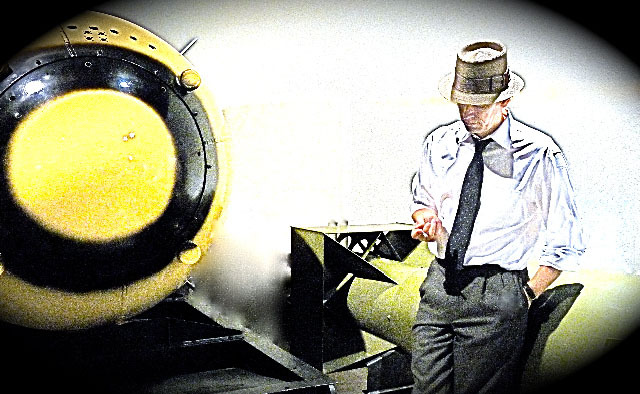At the very least, Mother Road Theatre Company’s production of The Love Song of J. Robert Oppenheimer is ambitious. Written by Carson Kreitzer, the play attempts to weave together the making of the atomic bomb, Jewish identity, hubris, guilt, original sin, the legacy of Lilith, Hindu texts and T.S. Eliot. It’s a lot.But then again, if the primary subject is Robert Oppenheimer, the father of the atomic bomb, the approach should be a complicated one. Oppenheimer led the Manhattan Project, which successfully developed the bombs dropped on Hiroshima and Nagasaki. As played by Christopher Atwood, Oppenheimer is closed, serious, seduced by the prospect of using science to understand the universe.There is a repeated line in T.S. Eliot’s “The Love Song of J. Alfred Prufrock” that could serve as a sort of thesis for the play: “Do I dare / Disturb the universe?” It pops up often in the production, but whereas for Prufrock the line is emblematic of his crippling self-doubt, for Oppenheimer it’s a battle cry. Do I dare? Yes I do! This is not to say that the creation of a nuclear device is undertaken lightly. Though, as a Jew, Oppenheimer feels especially compelled to aid in the defeat of Hitler, the physicist acknowledges the significance of this experiment in fission and destruction. This conflict is dramatized in the appearance of Lilith, the first woman. Made by God from the same dust as Adam, she’s relegated to the role of demon when she refuses to yield to the man’s authority. Eve is then made from Adam’s rib and becomes the mother of humanity. Kept out of the role of life-giver, Lilith rejoices in life-taking. She wants the bomb, just as he does.Though there’s an obvious kinship between Oppenheimer and Lilith ( Danielle Louise Reddick), he shares one with Eve as well. The pursuit of knowledge for its own sake can have deadly consequences, and each time such destruction happens, there is the hope that next time humanity will be wiser—that eventually, one big loss will be enough. Mother Road’s production (directed by Vic Browder and Julia Thudium) isn’t so much blocked as it is choreographed. Characters, including military men, scientists and lovers, move in and out from all sides. They act behind closed metal mesh panels, against the suggested mountains of Los Alamos and the desert of the Trinity Site. Reddick as Lilith has the greatest physical challenge. She is primordial, slinking and scurrying above the action on platforms suspended by chains, dipping and lurching into the action without ever deigning to join it. Her movement is compelling and flawless.Oppenheimer’s wife Kitty, as played by Vivian Nesbitt, is layered; calm and witty on one level and nervous and frenzied on another. Nesbitt’s vocal work is particularly strong, perhaps unsurprising in that she’s the co-producer of Art of the Song Creativity Radio ( artofthesong.org). The play’s other four actors—Courtney Cunningham, Brian Haney, Mark Hisler and William Sterchi—take on multiple parts, changing costumes, inflections and accents at a surprising pace. The subject, essentially that of good and evil, is handled by simplifying the storytelling scale with a stark set and small cast.On opening night, The Filling Station was packed. In fact, it was over-packed. Somehow there were about 12 more bodies than there were seats, and so various people involved with the production gave up their spots. The excitement in much of the audience was also evident in the cast, at times manifesting itself in botched lines and uneven energy. Yiddish accents transmuted into Irish ones while some cues were, if not missed, then ignored for a bit. The two main players, Atwood and Reddick, do a largely wonderful job. Atwood, a recent transplant to Albuquerque, gives a solid performance. His body language is especially powerful; as he smoked a cigarette in the particular way of an early 20 th -century American man, it seemed entirely possible that his mind was busy exploding atoms, disturbing the universe. On that first night, though, both he and Reddick seemed to be sussing out how best to play their very different parts in a small space. Atwood has the challenge of memorizing the majority of the script. He serves as the anchor and sometimes seemed pulled down by the weight. Reddick, meanwhile, fought to strike a balance that conveys Lilith as being beyond life without rendering the performance histrionic. But that was opening night. There is a prodigious amount of power and talent behind The Love Song of J. Robert Oppenheimer. Though the ending isn’t surprising, the journey there certainly is.
The Filling Station (1024 Fourth Street SW)Show runs through Oct. 4Thursdays and Fridays at 8 p.m., Saturdays at 6 p.m., and Sundays at 2 p.m. Tickets $16motherroad.org










